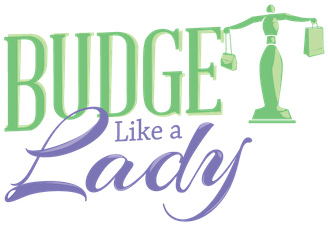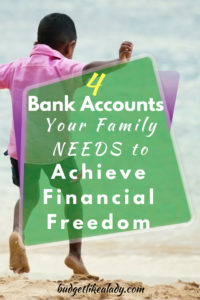4 Bank Accounts Your Family NEEDS to Achieve Financial Freedom

How to Get the Best Price on Cheap School Supplies This Year
July 31, 2018
No More Surprise Bills! How to Plan for Unexpected Expenses
August 21, 2018Estimated Reading Time: 5 Minutes
Have you gotten to the point with your finances that you feel like you are doing good, but you would rather be doing great? You are doing everything right (paying bills, saving money, getting out of debt, etc.) but you feel like you are missing something?
Let’s talk about the bank accounts your family needs to achieve financial freedom. I have created a list of bank accounts that I believe all families should have to help maximize the return of their money and be better prepared for today, tomorrow, and 10 years from now.
What is Financial Freedom?
Financial freedom is the ability to stop feeling stressed about money. Paying bills, everyday expenses, and unexpected car repairs do not have to always result in a panic feeling or feeling overwhelmed. Financial freedom also does NOT mean hitting the lottery tomorrow and never having a financial care in the world.
Although each family may have their own definition of what financial freedom looks like to them, every family wants the same outcome: not letting money stress them out anymore!
But while you are saving money and paying off debt, where are you supposed to stash your cash? Some bank accounts are better than others when it comes to storing your money.
Bank Accounts You NEED
So, what’s need and what’s not and what bank accounts are optional? Each account serves a different purpose and serves as a stepping stone to your family’s financial freedom.
Checking Account
Checking accounts are mainly used for:
- Paying bills
- Everyday expenses
- Depositing Income
You can sign up for a checking account at your local bank. Although there are a lot of free checking accounts, be careful of bank fees with free accounts. Some banks require you to have a minimum balance in the bank account for it to remain free. If you fall below the minimum balance, the bank can charge you a service fee (usually $20 a month), and we don’t want that.
Savings Account
Often a bank will offer free savings account with your free checking account. Take it! This account can be used for your short-term savings such as:
- Vacations
- Sinking Funds (money for expected and unexpected expenses)
- Quarterly bills
- Bills reoccurring every 6 months or less
This savings account is to be used for quick access when you need it. Transferring money between your checking and savings account (assuming they are at the same bank), only takes a matter of minutes. Although this savings account is easily accessible, it has a low-interest rate and you won’t earn too much while storing your money there which is why you also need the next account I am going to mention…
High Yield Online Account
High yield online accounts are savings accounts that are great for storing the following:
- Emergency Fund
- Annual Bills and Subscriptions
- Christmas Fund or other big annual holidays
Online banks usually have the highest interest rates because they have low overhead. Common banks to find high yield accounts are Ally, Capital One 360, Barclays, and more. Check out Google to get the latest interest rates. These banks are also FDIC insured like your local checking and savings accounts. That just means that if anything happens to the bank, the government will reimburse your money up to $250,000.
Retirement
- Company Sponsored Plan (401k, 403b, TSP, etc.)
- IRA (Roth or Traditional)
- Self Employed Retirement Accounts (SEP IRA, Solo 401k, Simple IRA, etc.)
Whether you are retiring in 40 years or 40 days, you need to always think about your retirement. First, if you are employed, check and see if your company has a retirement plan. If your company does not offer a retirement plan, then you can sign up for one at a bank. Roth and traditional IRAs are available to anyone but have certain restrictions. If you are self-employed or a freelancer, there are retirement accounts for you too. Check with your local bank to get set up.
Optional Bank Accounts
His and Her Checking: I know this is a big debate about joint accounts versus separate accounts, but I vote for both. I think married couples should have a joint account for bills and individual accounts for personal spending and gift giving.
Investment Account: Once you have all of the mandatory savings account in place, debt free, and extra money to save open an investment account to build your wealth. Investments accounts, also called brokerage accounts, are for buying stocks, bonds, and mutual funds.
College Savings Plan: Yes, I consider a college savings plan as an option. Retirement is a priority over college savings. Remember, kids can get student loans for college, but you cannot get a loan for retirement. Each state has their own 529 or ESP (educational savings plan). Research online about your state’s plans and talk to a financial advisor about which plan would be best.
Financial Freedom gives us options, the option to choose the kind of life that we want to live with the stress about money. Opening these important bank accounts will help your family achieve financial freedom fast and efficiently.
Financial freedom does not happen by accident…unless you hit the lottery…but the odds of winning the jackpot lottery is slim. But enough about the lottery, you are making it happen for your family and I am happy to help.
Are you on the road to achieving financial freedom? If so, what questions do you have about bank accounts?
For more information about money management, sign up to receive our newsletter.


